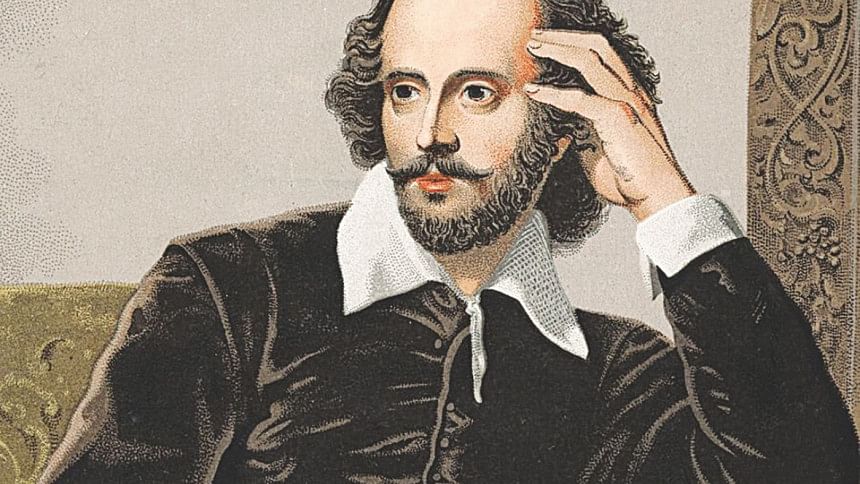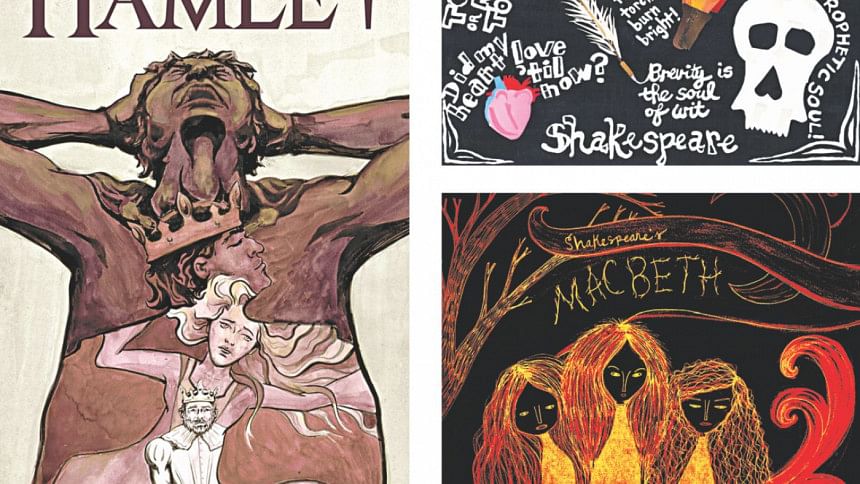The World's Bishwa-Kobi

A little less than a hundred years ago, Bishwa-Kobi Rabindranath Tagore, wrote a poem that he had titled simply "Shakespeare". Recollecting the occasion that led to the composition of the poem in Shantiniketan in 1921, he noted that he had written it in Shelaidah on 1915 on the occasion of the 300th death anniversary when requested to do so by the Shakespeare Tercentenary committee in Britain. I would like to mention here that Rabindranath had also published a serviceable English prose translation of the poem in English in1916 that was published by OUP, but let me note now that in the poem's opening line he addresses Shakespeare as "Bishwa-Kobi." Rabindranath declares in the poem that though England had claimed the poet immediately as its own national treasure and had honoured him and even sanctified him, it was left to time to elevate the poet from the island till he transcended England itself to shine in a universal sphere. Eventually, Rabindranath declares, Shakespeare had become so much part of India that his praise was ringing forever on the shores of the Indian subcontinent.
As we know, while the truly luminous one can be appreciated by multitudes he can be understood fully only by the truly great person. Rabindranath's simple but beautiful tribute captures Shakespeare's ascension to the galaxy of world writers in the centuries after his death and shows how he had become all-conquering and undoubtedly the best loved writer the world has known, if not the greatest writer of all times.
But how did Shakespeare become so universally admired and why is the world, including Bangladesh, celebrating his 450th birth and 400th death anniversary with such ceremony and endless praise?
Perhaps the best answer that can still account for Shakespeare's enduring popularity all over the world, something that has not been the fate of our own Bishwa- Kobi, who, after a few decades after Gitanjali and the Nobel prize, seems to have been almost forgotten in many parts of the world, is to be found in Dr. Johnson's brilliant "Preface to Shakespeare". Introducing his landmark edition of Shakespeare in 1765, Johnson observed, approximately 150 years after the death of the dramatist and poet, that although his friend and rival Ben Jonson had noted that Shakespeare perhaps knew "small Latin and less Greek" even while singing his praises, Shakespeare surpassed all writers because he was able to come up with "the best representations of nature". Or as Dr. Johnson puts it a little later, he is "above all writers…" because he was a poet "who holds up to his readers a faithful mirror of manners and of life." And still more memorably, Dr. Johnson declares with the kind of simplicity and brilliance that makes his observations on Shakespeare so outstanding, if his plots were taken from life, his characters are such "as the world will always supply and the world will always find."
The world took to Shakespeare, then, because Shakespeare had taken in the world better than any other writer of his time. This is what made him so much of his time and yet timeless. His plots could be accessed by people young or old, his characters would grip people everywhere time and again, whether they were ordinary men and women or kings and queens whose lives of high drama always fascinate us. Indeed, Shakespeare's plays are supremely dramatic; his settings, themes, situations, as well as his characterisation and verse can be appreciated by people of all ages. I remember, for instance, going to the Old Vic production of Shakespeare of The Tempest in Dhaka's Engineering Auditorium in 1964, in his 300 centenary year as a thirteen- year-old and feeling simply mesmerised by the actions and characters; by the fatigued and lost sailors rowing to the shore after being shipwrecked; by the sight of the beautiful Miranda discovering the handsome Ferdinand; by viewing the ugly Caliban protesting against Prospero's usurpation of his island, and by the magic with which Prospero subdued him. I remembered in 1965, going to the British Council to see a film version of Richard III, where the difficult verse had almost put me to sleep, but where I woke up in wide-eyed admiration to hear the mesmerising Olivier deliver the unmatchable and gripping lines, "A horse! A horse! My Kingdom for a horse!" I remember towards the end of the decade enjoying immensely "Mukhara Romoni Bashikoron", the Bangla version of The Taming of the Shrew in Muneir Choudhury's excellent translation and Golam Mostafa and Ajmeri Zaman's superb acting on Dhaka television; it was a play so popular that it kept being aired on television repeatedly in the late 1960s and the 1970s.

In fact, Shakespeare had come to Bengal at least a century earlier. He was first introduced to Bengalis of Hindu College in 1853; not long after he was on the city stage either through translations or adaptations. Indeed, Shakespeare played his part in the Bengal Renaissance and Bhranti Bilas by Iswar Chandra Vidyasagar is an example of the way a play like The Comedy of Errors could be rewritten for the Bengali stage. Rabindranath's brother Satyendranath Tagore seemed to have attempted a rendering of Shakespeare's Cymbeline through the play titled Sushila Birsingha Natok in 1868. When Rabindranath himself seemed unwilling to be taught conventionally, a tutor named Ganchandra Bhattacharjya decided to attract the young boy to his English lessons by making him translate parts of Macbeth into Bengali around 1874. But it was not in the Tagore family alone that this Shakespeare play cast a spell. Giresh Chandra Ghose, the famous playwright, director and actor of the second half of nineteenth century Kolkata, staged Macbeth there in 1893. And there were many other such performances in nineteenth century Calcutta of this and other Shakespearean plays. And Macbeth, let me add in passing, would be translated superbly by Syed Shamsul Huq and performed to widespread acclaim in Dhaka some years later.
Shakespeare then has been able to capture the imagination of the people of Bengal for a long time now. I remember at this time how in Shakespeare's 300th birth centenary in 1964 educated Bengalis not only in Dhaka but also in provincial towns, would have a copy of the low-priced one volume English Language Book Society one-volume edition of his plays and poems displayed prominently in their book shelves. The book was popular as a gift item, an index certainly of how admired he was in our part of the world as well as the English-speaking countries by then.
But it will be wrong to talk about Shakespeare's presence in the world only on the stage or in books, whether in the original or in translations. As I became involved in the Film Society movement in Dhaka in the 1970s and during my stay in Canada at the end of the decade and in the early 1980s I had the opportunity to see quite a few films based on his plays. To me, what was immensely fascinating was how great actors and directors kept making their own distinctive versions of the major Shakespearean films. To discuss briefly the variety of interpretations possible of just one play, let me instance Hamlet. I saw it first in Laurence Olivier's 1948 version and then in the Russian director Grigori Kozintsev's 1964 rendering; later I saw Franco Zeferrelli's 1990 version starring Richard Burton and then the 2000 one by the American director Michael Almyereda set in contemporary New York. What was amazing was how different these film versions were—Olivier's Hamlet seemed driven by Freud's vision of the Oedipus Complex; Kozintsev's necessarily minimised dialogue and opted for images; Zeferelli's seemed to be a vehicle for Richard Burton's intense performance and the Almyereda film opted to be postmodern in its approach. The ghost, for example, appeared on closed-circuit TV in it and not as a separate presence on the stage and the tension between brothers and uncle and nephew,s the result of boardroom feuds of New York big businessmen. Clearly, Shakespeare is for all times, all countries, and all mediums—he originated in Elizabethan and Jacobean London, fascinated nineteenth century Kolkata, became popular in 1960s Dhaka, and has kept appearing and reappearing on the stage, in print and on TV and film screens. And he can be interpreted anew, and variously, for his works have it in them, as do the greatest works, the capacity to be reinterpreted endlessly.
What is it that makes him so eternally present and what has induced so many viewers, readers, directors, actors and film and TV greats to recreate him again and again? What has made him so relevant for our age as well as other ages? Perhaps some of the best answers to these questions are to be found in the essays collected in the Polish theatre director Jan Kott's 1964 book, Shakespeare Our Contemporary. Kott's answer is really a more elaborate version of Dr. Johnson's, for while he too stresses like the English writer that Shakespeare's plays relate to everyday lived lives, the Polish director emphasises Shakespeare's capacity to capture eternal and essential history as the ultimate reason why he was so in tune with the twentieth, as all other centuries, Kott writes as someone who has the two twentieth century world wars, Hiroshima, Nagasaki and the Cold War, the experience of Nazism, Fascism, and Stalinism etched in his consciousness, and he feels that the capacity to spark and renew such memories and experiences through his plays make Shakespeare our contemporary.
Jan Kott reads Shakespeare's history plays and tragedies as theatre exploring the eternal struggle for power and over territory. Whether the play is Henry IV, Part 1 or Hamlet or King Lear, the main characters are locked in seemingly endless battles to grab power and kingdoms. Violence and war are constants in these plays as they are in history,
and the contestants are like real men and women involved in making history or being defeated by it. King Lear Kott reads as "endgame", that is to say, a play contemplating the end of history. Politics and brooding on a world so riven by violence are central elements in Hamlet. But history can be farcical as well as grand; great people can be silly as majestic, and that is what Shakespeare knows so well. The destructive passions consume relationships in his plays even if love animates them—greed, jealousy, anger and lust are rampant in them. But there is wit and humour and even the grotesque in his works. Most of the comedies depict romance, but love is not all in them. On the other hand, the erotic is never far away either. The greatest compliment Kott gives Hamlet in his brilliant chapter on the play—and this could be said of all Shakespearean plays—is that it is like a sponge and in acute readings or excellent performances, "absorbs all the problems of our time" and one could add, all our desires. Or as he puts it so well, Shakespeare is our contemporary, and as he says, echoing Dr. Johnson, Shakespeare's plays, are mirrors, reflecting life, past and present and making us think about the future. In the Tempest, for instance, Shakespeare is already signalling the beginning of the epoch of the power play of colonialism and the brutalisation of natives.
However, I must say that as I grew older and more adept in reading Shakespeare for pleasure as well as gain, it is his language and poetry, in the plays as well as the sonnets that I have come to admire the most. Shakespeare, certainly, is the greatest dramatic poet in the English language, and I dare say, any language. And so as I end, let me leave you with a few of my most favourite Shakespearean lines, which I would want you to appreciate as much for the style as their contents. From the comedy, A Midsummer Night's Dream:"The course of true love did never run smooth". From A Merchant of Venice: "The quality of mercy is not strained/ It drops like the gentle drop of heaven." From Hamlet, of course, "To be or not to be/That is the question." From Macbeth, "Life's a tale told by an Idiot/Full of Sound and Fury signifying nothing." And from a sonnet, "Let not the marriage of true minds/admit impediments/ Love is not love which alters when it alteration finds."
All these lines I quoted from memory, and let me declare I have a terrible memory. But Shakespeare is truly memorable. And you and I, citizens of the world, are like Hamlet, with his rich legacy to contend with, and Shakespeare is like his father's ghost, but saying benignly "Remember me!" to all of us. And on this day, I feel that Shakespeare will haunt us as a good spirit forever and will be forever be our contemporary, in Bangladesh, Botswana, Bermuda or Britain! It is our privilege then to honour and treasure him, here in Bangladesh and surely everywhere else in the world, taking him from anniversary to anniversary, year after year, decade after decade, century after century, till the end of time.

 For all latest news, follow The Daily Star's Google News channel.
For all latest news, follow The Daily Star's Google News channel. 








Comments